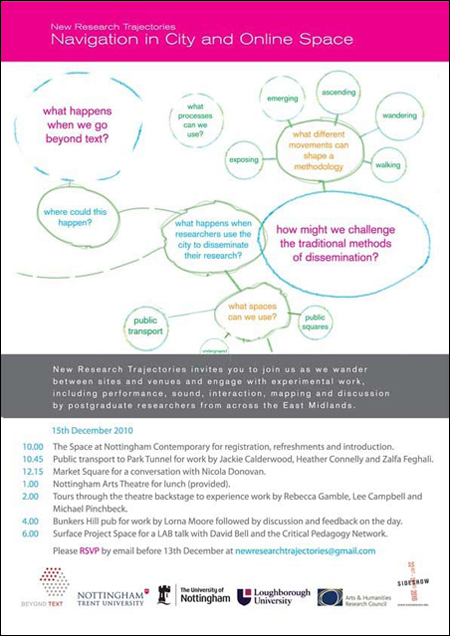Early Career Fellowships – Notes on CAS Event
Thursday, January 26th, 2012Yesterday I was happy to attend an Early Career Fellowships Event organised by the Centre for Advanced Studies in the Arts and Social Sciences (CAS) at the University of Nottingham.
Whilst the event drew on funding opportunities and support services specific to the University, it primarily focused on the key national funding schemes relevant to the Arts and Social Sciences, and general advice on applications, which might be useful to pass on.
Kicking off, Prof. Pat Thomson – in her capacity as CAS Director and an ESRC reviewer – located the role of fellowships in the post-doctoral landscape, and provided an honest assessment of the current opportunities facing new researchers in an increasingly competitive field. She stressed the need to be flexible, opportunistic and entrepreneurial. There was no mistaking that the limited number of fellowship awards represent a highly sought-after opportunity for academic career development, and that potential applicants should also consider other trajectories including: teaching posts, working as a post-doc on research projects (with possible opportunities for limited teaching), and external non-academic research work in the public, private and voluntary sectors.
Lisa McCabe from CAS ran through the main national award schemes relevant to the Arts and Social Sciences, namely:
- AHRC Early Career Fellowships
- ESRC Future Research Leaders
- Leverhulme Early Career Fellowships
- British Academy Post-doctoral Fellowships
Each have their own specific requirements and conditions of eligibility, but from these some common concerns and tips for applicants emerged that were re-emphasised by subsequent speakers.
It was stressed that applications should not be seen as a reworking or extension of doctoral theses, but a proposal for an original and timely piece of research in a significant field of study. The Leverhulme award in particular has an emphasis on originality and might privilege applications that challenge traditional disciplinary boundaries. Evidence of pilot work (including publication) may be advantageous, though not to an extent that risks concerns over ‘double funding.’
Crucially, reviewers of Early Career Fellowships give equal quality weighting to the project and to the applicant. Therefore, applicants should clearly demonstrate their ‘independent research potential’ and passion for the research subject.
Review bodies are commonly multi-disciplinary, and applications should have a clear rationale that engages a non-specialist audience. Ample time should be given to writing applications, inviting feedback from senior academics, such as supervisors, thesis examiners, and heads of school, as well as successful award holders, whilst making the most of research support services in the university.
It was stressed that applicants are eligible for most fellowship awards for several years after successfully gaining their doctorate. Whilst some may be fortunate to be awarded a fellowship soon after graduation, many will require the extra time gaining experience in teaching and research work and consolidating their publication output to be in a position to develop a successful application. As such, it is common for applicants to reapply for fellowships, though some schemes may have conditions on the timing of reapplications.
Not surprisingly, the need for strong evidence of work through peer-reviewed publications was emphasised throughout the event. Briony McDonagh, a successful Leverhulme ECF holder, explained how she worked as a post-doc for two years before receiving her award, giving her the opportunity to develop further journal articles from her thesis.
In addition, significant evidence of partnership and networking activities, knowledge exchange and public engagement are greatly valued.
Svenja Adolphs, an ESRC Grant Assessment Panel member, provided further insight on impact and outreach activities from a reviewer’s perspective, suggesting applicants involve end-users in the process of developing the application. It may not be sufficient to merely identify potential partnerships – a full commitment should be sought. She also reminded us that impact activities need to be evaluated, and that the method of evaluation should be described.
University of Nottingham researchers can access the presentations and further information on the CAS Workspace.



